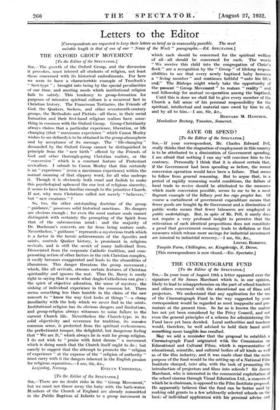Letters to the Editor
[Correspondents are requested to keep their letters as brief as is reasonably possible. The most suitable length is that of one of our " News of the Week " paragraphs.—Ed. SPECTATOR.] THE OXFORD GROUP MOVEMENT [To the Editor of the SPECTATOR.]
Sin,—The growth of the Oxford Group, and the discussion it provokes, must interest all students of religion, not least those concerned with its historical embodiments. For here we seem to have a characteristic example of Troeltsch's " Sect-type ; brought into being by the special peculiarities of our time, and meeting needs which institutional religion fails to satisfy. This tendency to group-formation for purposes of intensive spiritual culture is a recurrent fact in Christian history. The Franciscan Tertiaries, the Friendi of God, the Quakers, Seekers, and other seventeenth-century groups, the Methodists and Pietists—all these, in their social formation and their first-hand religious realism have some- thing in common with the Oxford Group. Group-Christianity always claims that a particular experience, liberation, or life changing (that "maximum experience " which Canon Mozley wishes to see defined) is to be obtained in the group-atmosphere and by acceptance of its message. The life-changing demanded by the Oxford Group cannot be distinguished in principle from the " new birth " offered by the Friends of God and other thorough-going Christian realists, or the " conversion " which is a constant feature of Protestant revivalism. I submit to Canon Mozley that this certainly is an " experience " (even a maximum experience) within the normal meaning of that slippery word, for all who undergo it. Though it is obviously both cruel and foolish to make this psychological upheaval the one test of religious sincerity, it seems to have been familiar enough to the primitive Church. If not, why were Christians called not merely " believers," but " new creatures " ?
So, too, the other outstanding doctrine of the group " guidance," possesses solid historical sanctions. Its dangers are obvious enough ; for even the most mature souls cannot distinguish with certainty the prompting of the Spirit from that of the subconscious mind : and the majority of Dr. Buchman's converts are far from being mature souls. Nevertheless, " guidance " represents a mysterious truth which is a factor in the heroic achievements of the Apostles and saints, controls Quaker history, is prominent in religious revivals, and is still the secret of many individual lives. Dissociated from the corporate Catholic tradition, and com- pensating action of other factors in the rich Christian comPlex, it easily becomes exaggerated and leads to the absurdities of illuminism. This danger threatens the group movement ; which, like all revivals, stresses certain features of Christian spirituality and ignores the rest. Thus Dr. Barry is surely right in saying that it needs what Anglo-Catholicism can give : the spirit of objective adoration, the sense of mystery, the sinking of individual experience in the common lot. There seems something less than humble in the claim of the raw convert to " know the way God looks at things "—a cheap familiarity with the holy which we never find in the saints. Institutional religion has its obvious dangers and limitations, and group-religion always witnesses to some failure in the current Church life. Nevertheless the Church-tyPe, in its solid objectivity and reverence for tradition, its massive common sense, is protected from the spiritual cocksureness, the perfectionist temper, the delightful, but dangerous feeling that " We are It," which always lie in wait for group religion. I do not wish to " praise with faint damns " a movement which is doing much that the Church itself ought to do ; but merely to suggest that the attempt to promote the " religion of experience " at the expense of the " religion of authority " must carry with it the dangers inherent in the English passion for religious separatism.—I am, Sir, &c.,


























 Previous page
Previous page